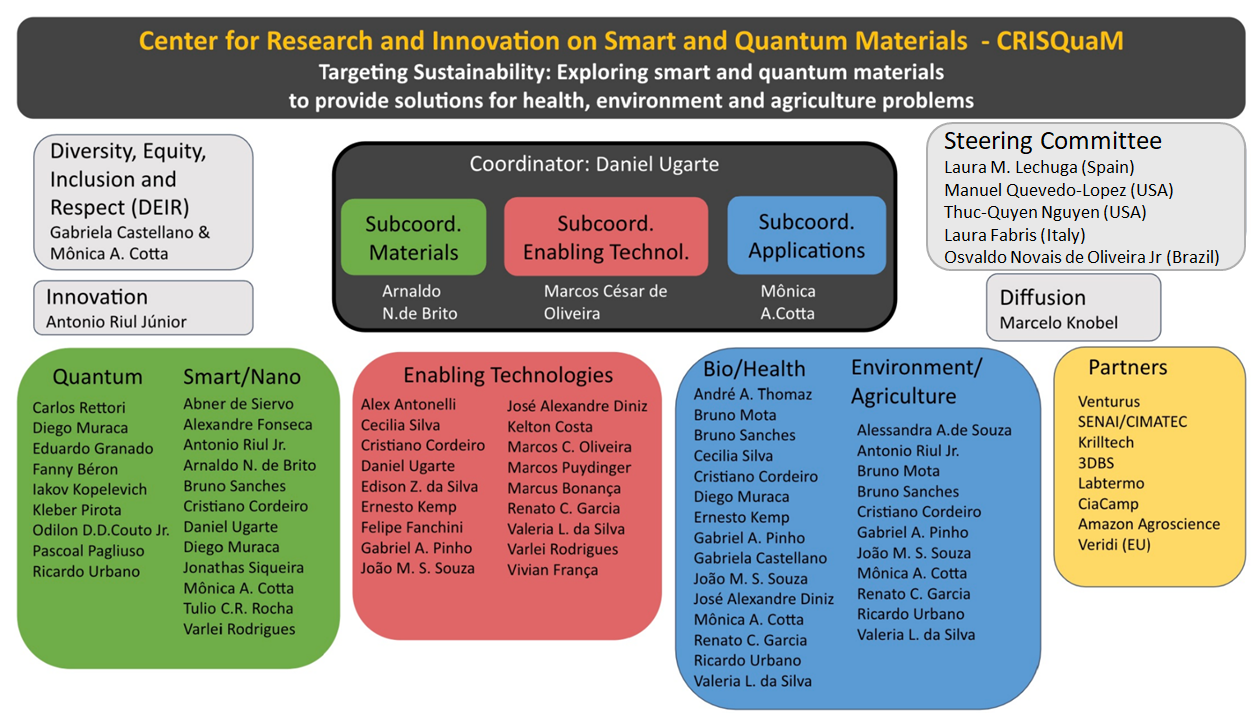BV-FAPESP: research projects supported in this Center
CRISQuaM in the Media: news about the center
CRISQuaM aims to explore the synergistic development of fundamental and applied science to create new materials with high potential for the construction of devices and sensors to address technological challenges related to sustainability, climate change, precision agriculture, ecology, and health. To achieve these goals, we have assembled an interdisciplinary and collaborative research team, integrating expertise across various scientific domains, researching novel materials with high innovation potential. By combining original synthesis methods, advanced characterization techniques, theoretical approaches, computational simulations, quantum technologies, and device construction designs, we aim to drive advances in smart and quantum materials, promoting scientific excellence and technological development. With this, we plan disruptive innovations in instrumentation—including hardware and AI-based tools—as well as in quantum technologies, biomedical devices, and signal processing, in addition to plant bionics, exploring plant-pathogen interactions. Besides research activities, we plan intensive actions in education, dissemination, and communication for the general public, as a modern society should be aware of the challenges humanity faces and how research and technology are essential for responsibly utilizing the planet's limited resources. CRISQuaM's Innovation activities are accelerated through partnerships with several companies in related technologies, many of them Brazilian. Finally, all activities of the Center are managed in accordance with diversity, equity, and inclusion goals and best practices.
The Center brings together scientists, engineers, and innovators in a collaborative effort to apply materials science and quantum technologies at the cutting edge, designing new materials and nano(bio)sensors for advanced diagnostics. The Center has a team capable of producing a wide range of (nano/micro) materials, along with precise chemical and physical characterizations using modern techniques (synchrotron, advanced microscopy, magnetotransport, magnetic resonance, optics, etc.). In addition, the team offers various options in enabling technologies, including miniaturization, processing, and additive manufacturing, as well as instrumentation, quantum sensing, and electronics development. Data analysis will employ updated approaches (numerical simulation, classical and quantum machine learning, and quantum optimization). Applications at the knowledge frontier will address urgent sustainability needs in environmental areas, precision agriculture, plant bionics, and biomedical interfaces, contributing to the development of local technologies in close partnership with the Brazilian industry.
The organization of the Center is based on three pillars — Materials, Enabling Technologies, and Applications — together with partner companies, as described in the figure below.

2025-10-08
According to a report by the consulting firm Emerge, almost half of the 952 science-based startups mapped in the country develop solutions in this area, especially for the health and agribusiness sectors.
2025-10-08
At the 7th FAPESP 2025 Conference, Denise Duarte, researcher at the University of São Paulo’s Faculty of Architecture, Urbanism, and Design, spoke about the need to map the impacts of extreme events on an individual scale and create urban thermal refuge areas in public spaces.
2025-10-08
Workshop held at the State University of Campinas as part of the Research Program on Global Climate Change outlines the challenges to be faced and the scientific efforts to predict and mitigate the problems caused by global warming.
2025-10-08
An analysis was conducted by Carlos Henrique de Brito Cruz, former scientific director of FAPESP, using the Elsevier Scopus database, which covers 100 million publications and over 7,000 scientific publishers worldwide.
2025-10-08
Researchers develop technology that identifies highly potent and dangerous psychoactive substances. The device can be used in emergency medical facilities and to help inform users and reduce the harm associated with consumption.
2025-10-08
The new functionalities allow the Cancer Theranostics Innovation Center to generate dynamic, more detailed images and provide more accurate diagnoses. The device is available to the scientific community in the state of São Paulo.
2025-10-01
Researchers at the University of São Paulo identify a new factor that explains the high prevalence of Alzheimer’s disease in older people with Down syndrome. The discovery paves the way for disease prevention strategies in this population.
2025-10-01
Researchers at the Federal University of São Paulo found that the toxicological effects of the drug on marine animals may be greater than those of cocaine. Preliminary results of the study were presented during the São Paulo School of Advanced Science on Emerging Pollutants.